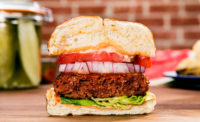Brabender: Alternative Proteins
Brabender uses IFFA in Frankfurt, Germany, to showcase lab equipment for alternative proteins

Consumers are increasingly more interested in their health as well as issues of environmental protection and sustainability. As a result, many of these same consumer-shoppers are increasing opting for alternative proteins derived from plants and even insects.
Germany’s Brabender® GmbH & Co. KG, Duisburg, planned to showcase several equipment solutions for meat substitutes and alternative proteins during the International Meat Industry Trade Fair (IFFA) in Frankfurt, from May 14 to 19.
Specifically, Brabender planned for its booth to showcase live extrusion on a laboratory scale. On display are Brabender’s TwinLab-F 20/40 twin-screw extruder and a Modular Cooling Die to produce a meat-like strip from soy protein concentrate that can be further processed into a burger patty.
"The extruded strip forms the preliminary product for a vegan burger and still needs to be shredded and mixed with additives. Then the meat substitute can be pressed into shape, fried and eaten,” says Michael Landers, an application technician at Brabender.
Meat alternatives from plants and insects
The fact that more and more customers are interested in meat substitutes is also noticeable at Brabender.
"We have recently received more and more enquiries about meat alternatives made from insect and plant proteins,” adds Landers.
Besides soy protein, proteins from pumpkin and sunflower seeds, lupins, fruit flies, mealworms and hemp can also be processed into plant-based meat analogues.
Other devices at Brabender’s booth will be its MT-CA, for determining material moisture; as well as the ViscoQuick and the Convimeter II. These units help determine the viscosity of a wide variety of materials in laboratory and production environments.
Juicy meat substitute from legume flour
One of the latest applications at Brabender involves a collaborative project with the company Müller's Mühle. The two companies have analyzed the quality of various pulses such as lentils, peas, fava beans and chickpeas.
In addition to the water absorption and gelatinization properties of pulses flour (analyzed with Farinograph and ViscoQuick), they have developed a time-saving method for measuring the oil absorption of pulses flour by using Absorptometer C. In the production of meat substitutes from pulses, the oil absorption properties of the flour are important for the optimal oil addition in an extrusion process and finally also to guarantee the juiciness of the final product.
Brabender will be showing its entire range of products and services at IFFA in Hall 9.1 on booth F20.
Looking for a reprint of this article?
From high-res PDFs to custom plaques, order your copy today!





